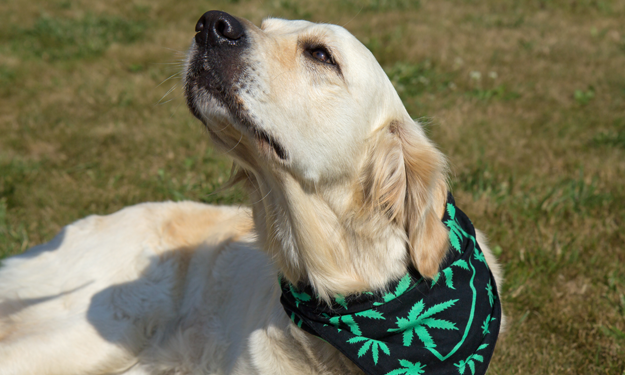Treatment and Diagnosis of Marijuana Toxicity in Pets

Written by Nancy Thompson, CVT
Marijuana has become legal in many states and is becoming very common in households for medicinal and therapeutic purposes. With this, the Pet Poison Helpline line has experienced a 448% increase in marijuana toxicity cases over the past 6 years. Here’s some information that you need to know about marijuana ingestion in pets.
What is marijuana?
Marijuana or Cannabis sativa/Cannabis indica is used for recreational and medicinal use. Tetrahydrocannabinol (TCH) and cannabidiol (CBD) are the two most commonly recognized, utilized, and studied cannabinoids (although there are over 80 different cannabinoids in marijuana plants.) The primary difference between between the two is that:
- THC causes psychotropic effects and has a moderate level of toxicity.
- CBD is non-psychotropic and is felt by many investigators to be non-toxic or have limited toxicity.
The exact amount of each cannabinoid varies widely from strain to strain and plant to plant.
Clinical signs of marijuana toxicity in pets
Pets can be poisoned by marijuana in many different ways, such as ingesting marijuana edibles (brownies or pot butter), ingesting their owner’s marijuana supply in any formulation, or by secondhand smoke. Some common symptoms of toxicity you may see are:
- Sedation/lethargy
- Dilated pupils or glassed over eyes
- Dazed expression
- Difficulty walking
- Vomiting
More severe symptoms can include:
- Low or high heart rate
- Vocalization such a whining/crying
- Agitation
- Trouble regulating temperature causing body temperature to drop or rise
- Incontinence/dribbling of urine
- Tremors
- Seizures
- Potentially coma
Signs can be seen anywhere from 5 minutes to 12 hours after marijuana exposure and can last from 30 minutes to several days depending on the dose ingested and the size of the pet. If the animals ingested the marijuana in the form of baked goods such as a brownie or cookie, special consideration should be taken to ensure chocolate toxicity is not occurring as well.
Treatment
Although there is no true antidote for marijuana, veterinarians can give supportive care to help pets through the clinical sings. This may include:
- Supportive care for regulating body temperature to ensure pets aren’t too hot or cold
- IV/SQ fluids to help maintain hydration
- Anti-vomiting medication to help with fluid loss
- Monitoring the pet’s heart rate to ensure it’s stable
- Providing a safe area so pets don’t injure themselves if they’re having trouble walking.
- In some cases, veterinarians may give activated charcoal (a liquid pets drink that helps to bind the toxin in the stomach or intestines and prevent absorption into the body.
Pets typically do well with supportive care, however large ingestions of marijuana can be dangerous. Some common problems with diagnosing and treating marijuana toxicity is due to incomplete history due to stigma, owners being on vacation, pharmaceutical products, or legal repercussions. It’s important to reassure owners that the hospital is only interested in providing appropriate medical care for their pet. This is necessary so that their pet is getting treated appropriately and not getting anything that isn’t necessary.
Prevention
To prevent marijuana toxicity in your pets you must keep marijuana edibles and products out of reach in high cabinets or a locked drawer when not in use. If marijuana is being smoked, pets should be kept in a separate area with good ventilation until the smoke has cleared.
If you feel that your pet has ingested marijuana your best course of action is to have them seen and treated.
And please remember: it’s nothing to be ashamed or embarrassed about! If you don’t tell us that there is even a possibility that your pet ingested marijuana, then their diagnosis and treatment can be delayed. We are only interested in your pet’s wellbeing!
References:
https://www.petpoisonhelpline.com/pet-safety-tips/marijuana-toxicity-pets/
https://www.veterinarypracticenews.com/treating-marijuana-toxicity/